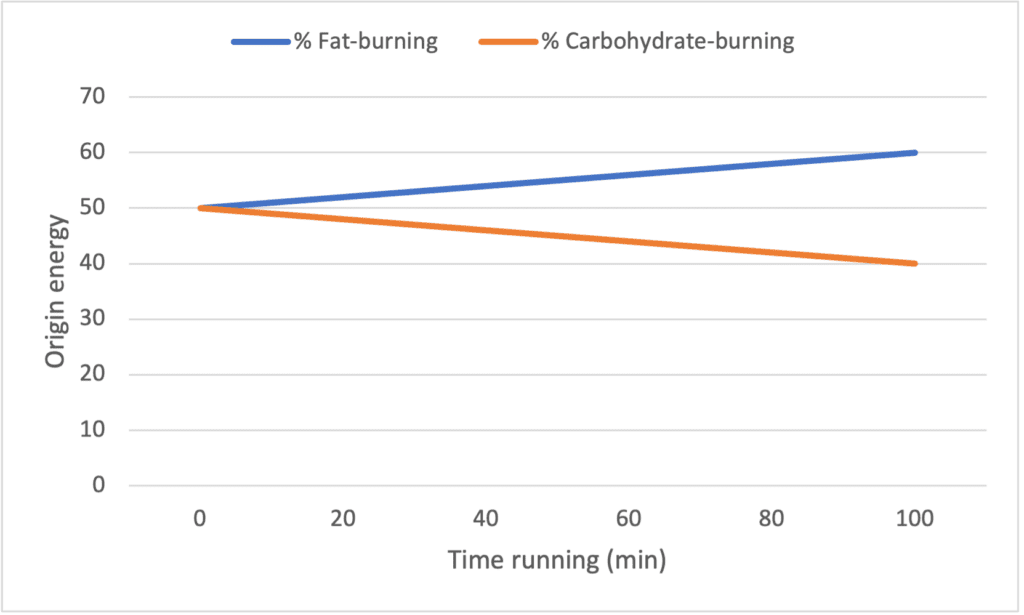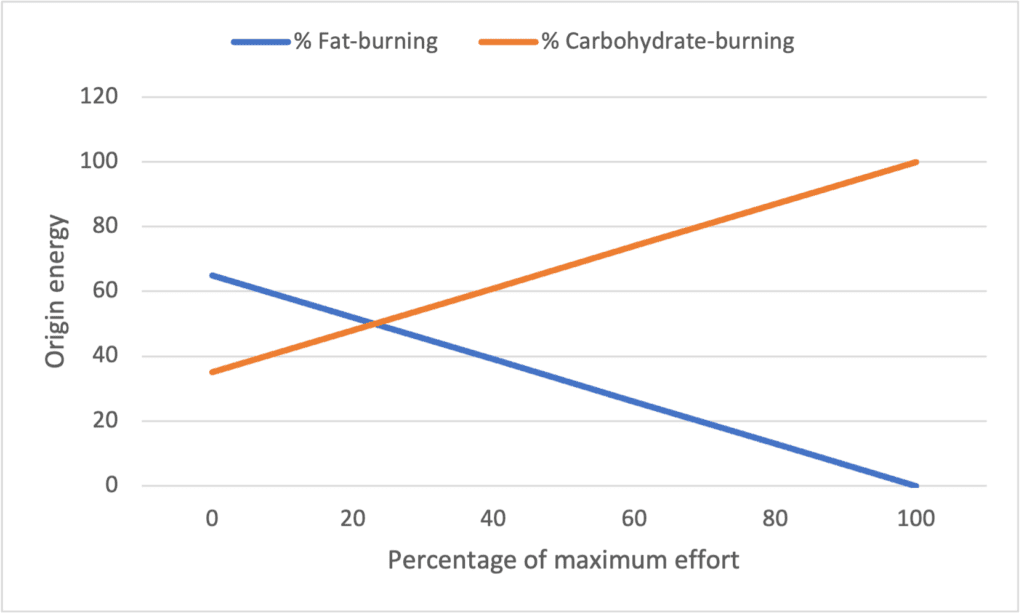Running is a popular sport and for good reason! You can plan it yourself whenever you want and it is very good for your health. A frequently asked question by runners is whether it is better to run faster or further. That is what we discuss in this article.
In short, we have seen that running longer has the advantage that you burn more fat and that running faster has the advantage that you will lose more weight per unit of time. Because they both have their own advantage, our advice is to alternate them. In addition, it is a good idea to try interval training, because you can possibly lose more weight per unit of time compared to continuous training.
Table of Contents
- Do you burn more fat by running faster or longer?
- Is it best to run faster or longer if losing weight is your goal?
- Is it better to run at a constant speed or changing speed?
- Tips to run faster
- Tips to run longer
- Conclusion

Do you burn more fat by running faster or longer?
During running, you get your energy by burning carbohydrates and fats. This means that during running there is always a certain ratio between carbohydrate burning and fat burning that depends on various factors.
Ok, so there is always a ratio between carbohydrate burning and fat burning, but does 1 of the 2 have an advantage?
Yes, of course! What is often wrongly thought is that by burning more fat you will lose extra weight, this is not true, because losing weight is purely about getting fewer calories through your diet than you burn.
Fat reserves can be seen in people in places where people usually prefer not to see them, such as the abdomen. By burning more fat, you will use these fat reserves and you will look fitter.
Now you may be wondering; to burn more fat, should I run faster or longer?
The answer is longer. To have the most fat-burning compared to carbohydrate-burning, it is best to run for a long time in a row. Over time, the percentage of fat burning increases linearly. In addition, it is good for the percentage of fat-burning to slow down a little bit when running. The heavier the effort becomes for you, the more you switch to carbohydrate burning.
In summary: to maximize the percentage of fat-burning compared to carbohydrate-burning, it is best to run for long periods at a leisurely pace. This principle is shown in the graphs below. Please note that estimated values have been used here.


Is it best to run faster or longer if losing weight is your goal?
As we mentioned before, losing weight is about burning more calories than you take in through your diet. To know whether it is best to run faster or longer, we have to look at calorie-burning.
If you run faster, you will logically burn more calories per unit of time. On the other hand, with a longer distance, you will also burn more calories. Is it more efficient to run faster or longer?
What we see is that if you run at a constant speed, your calorie-burning increases linearly with the distance you run. So, for example, if you burned 150 kilocalories after running 2 kilometers, you would burn 300 kilocalories after running 4 kilometers.
The burning of kilocalories does not increase linearly with running speed. If you run faster, the burning of kilocalories increases faster and faster.
So in short: increasing your speed is more efficient for burning kilocalories because you burn more calories per increase in speed compared to increasing your distance. In addition, if you run faster, you are also shorter on the road, so in terms of time, this is much more efficient.
Is it better to run at a constant speed or changing speed?
To answer this question, we will look at research that looks at the difference between interval training and continuous training. An interval training involves alternating a high intensity/speed with a lower intensity/speed. With continuous training, you logically keep the same pace.
For this, we look at a study[1] by M. Wewege and colleagues. In this study, there were 2 groups. One group did moderate-intensity continuous workouts and the other group did high-intensity interval workouts. Both groups consisted of overweight or obese adults.
As a result, the body composition of the 2 groups was examined. This had improved in both groups, there was no difference between the 2 groups.
So there was no difference between the groups, but it is important to realize that the interval training group had about 40% less training time. So it seems that interval training is more time-efficient than continuous training.
In other words, generalized to running; if losing weight is your goal, it is recommended that you give interval training a try. If you train for the same amount of time, you will probably lose more weight compared to if you would do continuous training.

Tips to run faster
We have discussed the benefits of running at a higher speed. Once you know the benefits, it is of course also very relevant to know what you can do to increase your running speed. That’s why we share some tips with you.
- A good warm-up : A good warm-up is essential for a good performance. Are you still looking for a suitable warm-up before running? Then click here. We will refer you to an article in which we share a simple warm-up of only 5 minutes that will improve your performance.
- Shorter steps : If you want to increase your speed, it is important that you take shorter steps. This has the advantage that you mainly use your energy in the horizontal direction, because you are less bothered by the limiting factor of gravity. The smaller steps will logically increase your stride frequency.
- Suitable running shoes : What people often underestimate is the effect of suitable running shoes. Many people are used to a certain shoe and think that this is fine. However, there is often a lot of benefit to be gained from changing shoes. If you focus on speed, it is recommended to buy a lightweight running shoe.
- Do strength training : Running at a higher speed naturally requires more power. It is therefore wise to train your leg muscles so that you can deliver this power. Make sure that you don’t run if you still have muscle pain in your legs, your performance will probably be disappointing in this case.
Tips to run longer
Now that you know how to run faster, it is also useful to know how you can run for longer in a row. Below we share a few tips.
- Land on your heels : This is not something you will really think about during your run, but it can help you enormously. It is the most energy efficient to land on the back of your foot and then roll your foot well. This saves energy, so you can run for longer in a row.
- Suitable running shoes : Good running shoes are also a must-have for longer runs. For long-distance running, I would especially pay attention to choosing a running shoe with good cushioning.
- Eat enough in advance : If you run for a long time, it can sometimes happen that your body has a shortage of fuels. It is therefore important to eat enough beforehand. Don’t do this too short in advance, because then you can suffer from, for example, side stitch on the way. Make sure you get enough carbohydrates, these are the most important fuel for your body.
- Watch your breathing : While running, your body must of course be supplied with sufficient oxygen. Therefore, an even breathing pattern is very important. Breathe in through your nose and out through your mouth.
Conclusion
As we have seen, both running faster and running longer have their specific advantages. Running faster has the advantage that you will lose more weight within the same time and running longer has the advantage that you burn more fat in percentage terms.
Because they are both good for you in different ways, our advice is to alternate them. For example, if you want to run 4 times a week, focus twice on the fastest possible speed and twice on a long time/distance in a row. In addition, it is recommended to try interval training. Research shows that you possibly lose more weight per unit of time compared to continuous training.
Lifestyle coach [5+ years of fitness experience]